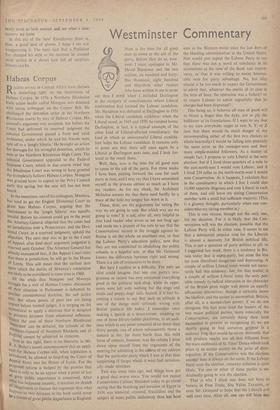Habeas Corpus
RECENT events in Central Africa have thrown a disturbing light on the limitations of Habeas Corpus. In 1956 a Northern Rhodesian trade union leader called Mungoni was detained with union colleagues on the Copper Belt. He challenged the detention order in the Northern Rhodesian courts by way of Habeas Corpus. His counsel's argument was accepted, but before the Court had delivered its reserved judgment the colonial Government passed a fresh and valid ordinance, under which he and his friends were sent off to a `jungle Siberia.' He brought an action for damages for his wrongful detention, which he won in the Northern Rhodesian High Court. The colonial Government appealed to the Federal Supreme Court, which in due course ruled that the Rhodesian Court was wrong to have granted the (completely hollow) Habeas Corpus. Mungoni was granted leave to appeal to the Privy Council early this spring, but the case still has not been heard.
In the meantime, one of his colleagues, Mwenya, has tried to get the English Divisional Court to grant him Habeas Corpus, arguing that the banishment to the `jungle Siberia' was equally invalid. Before his counsel could get to the point the Attorney-General objected that the court had no jurisdiction over a Protectorate, and the Divi- sional Court, in a reserved judgment, upheld the Objection. The next step was to go to the Court of Appeal; after four days' argument judgment is reserved until October. The Attorney-General has already announced that, if the Appeal Court rules that there is jurisdiction, he will go to the House of Lords. This will mean that the earliest date upon which the merits of Mwenya's contention are likely to be considered is some time in 1960.
All the while that Mungoni and Mwenya struggle for a writ of Habeas Corpus, discussion of their situation in Parliament is debarred by another constitutional doctrine, the sub judice rule. But where points of pure law are being argued before trained judges, it is verging on the nonsensical to apply a doctrine that is designed nonsensical lin Preserve jurymen from emotional influence. rnless the case of these Northern Rhodesian "trietees' can be debated, the attitude of the Attorneys-General of Northern Rhodesia and of England cannot be subjected to criticism. Seen in this light, there is no liberality in Mr. R. A. Butler's recent announcement that an appli- cant for Habeas Corpus will, when legislation is introduced, be allowed to leap-frog the Court of fttl3eal direct into the House of Lords. For the P,.rnposed reform is hedged by the proviso that Iere is only to be an appeal when a point of law onf great public importance is concerned. After wfnat has happened recently, it involves no stretch o nnagination to foresee the argument that what happens to two Africans in the bush could never be a matter of great public importance in England.


































 Previous page
Previous page